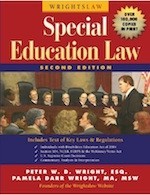In This Issue ...
Circulation: 97,336
ISSN: 1538-320
October 28, 2014 |
 What is bullying and how prevalent is the problem? What is bullying and how prevalent is the problem? - What happens when teachers and administrators fail to intervene?
- What impact does bullying have on students?
In this issue of the Special Ed Advocate you will find new OCR guidance about bullying prevention and intervention. Learn strategies for parents, schools, and kids to prevent this pervasive problem.
Please don't hesitate to forward this issue to friends, family members, or colleagues.
Follow Wrightslaw on Facebook & Twitter & Twitter |
| |
|
|

|
New Article! When Teachers Bully
Your first knee-jerk reaction is never the right way to handle a difficult situation with the school.
First gather your data, next organize your information and documentation. Parent advocate Susan Bruce explains steps you can take When Teachers Bully.
|
| |
|
|

|
School Obligations When Bullying Means a Denial of FAPE
The bullying of a student with a disability on any basis can result in a denial of FAPE under Section 504.
Schools are obligated to address conduct that may constitute a disability-based harassment. Schools must remedy the denial of FAPE resulting from disability-based harassment.
Published October 2014, new OCR guidance explains bullying and denial of FAPE.
|
| |
|
|

|
Bullying, Confidentiality, and a Parent's Need to Know
In How Much Information Should a School Provide?, Pete and Pam Wright answer questions about bullying and confidentiality.
Pam suggests a strategy to help the teacher understand the parent's perceptions, concerns, and fears. Pete describes similarities between bullying at school and similar incidents in other places.
|
| |
|
|

|
Section 504 Prohibits Disability-Based Harassment
Kids have a higher risk of being teased at school if they have a disability like:
- ADHD or autism
- diabetes or epilepsy
- stuttering or speech problems
When teasing crosses the line to become disability harassment, it is prohibited under Section 504 of the Rehabilitation Act of 1973.
Wrightslaw: Special Education Law, 2nd Edition, Section 504, p. 291.

Print Book & PDF Combo
|

Print Book |
|
| |
back to the top
|